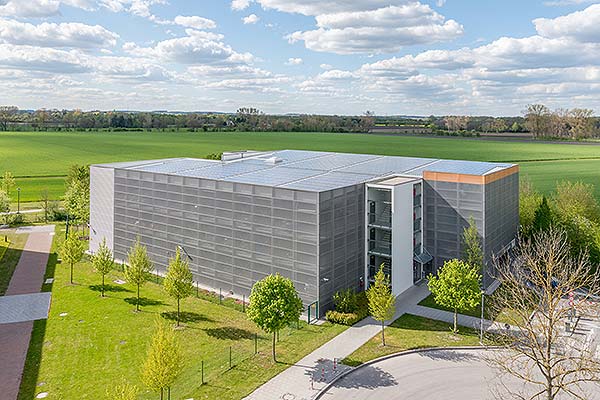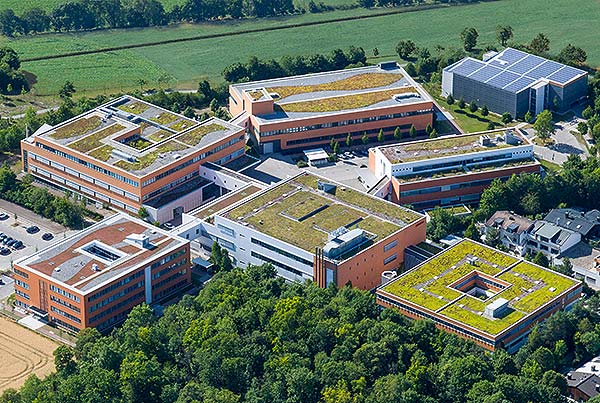
Schreiner Group’s parking garage roofs have photovoltaic systems installed on them. The entire share of renewable energies already amounts to more than 50 percent today.
Climate-neutral production from 2023 on and achievement of full climate neutrality by 2030—this is the strategic sustainability goal of Schreiner Group based in the district of Munich. As a result, the internationally oriented family-owned company for innovative high-tech labels and functional parts assumes a pioneering role in German industry.

In its strategic sustainability goal, Schreiner Group based in Oberschleissheim has decided to become fully climate-neutral by as early as 2030.
Photovoltaic systems are installed on the parking garage roofs, insect-friendly wildflower verges benefit the company’s own bee colonies, charging stations for electric vehicles are available on the plant premises, and the most recently erected facility is a completely climate-neutral “green building”—even from the outside it is clear that Schreiner Group does a lot for the environment. “But in recent years, we have even clearly achieved a lot more,” says Dr. Thomas Gulden, who is in charge of the family-owned company’s environmental management. “We succeeded in reducing CO2 emissions by 70 percent and our share of renewable energies amounts to more than 55 percent. Furthermore, we purchase only green electricity at our German locations.”
Now Schreiner Group has set itself an ambitious goal. “By manufacturing sustainable products, we intend to achieve climate-neutral production from 2023 on and full climate neutrality by 2030.” This is the strategic sustainability goal that the manufacturer of smart labels and functional parts has adopted. For this purpose, the company has concentrated and optimized all actions for CO2 reduction and energy efficiency, for resource conservation and avoidance of waste, as well as for compliance with corporate governance and protection of human rights.

In 2021, a total of nine electric vehicle charging stations were taken into operation on the plant premises. This year will see another increase in electric vehicles in the company’s fleet.
Numerous actions are being taken to further enhance energy efficiency and to further increase the use of renewable energies—from optimizing air conditioning systems to switching to LED lighting to expansion of electric mobility. Obviously, the company is paying particular attention to its products: CO2 emissions can already be significantly reduced today by using sustainable materials such as recycled ones instead of petroleum-based plastics. All sustainable products can be identified by the “Integrated Sustainability” logo. In addition, Schreiner Group reduces its amount of annual waste by nearly 300 metric tons as a result of recycling activities. Compliance with social standards is regulated in the company’s code of conduct and subject to regular reviews—including supplier compliance.
“Our strategic sustainability goal does not pay lip service to sustainability,” says CEO Roland Schreiner. “For us, climate protection, social sustainability, and environmental fairness are a matter of social responsibility that we, as a company, want to and have to live up to. As a family-owned business we have always understood our responsibility for our employees, our partners, and for our region. This is a responsibility we have for future generations as well.”
Dr. Gulden explains the process of developing Schreiner Group’s strategic sustainability goal: “We started by defining our key action fields.” For Schreiner Group, these are climate protection, our own products, and our sustainability system. “We then matched the demands of our stakeholders with these action fields, created a roadmap, and defined actions to be taken. All individual goals and all actions are found in our strategic sustainability goal.” Climate neutrality by 2030 is an ambitious goal—but one with a clear plan.


